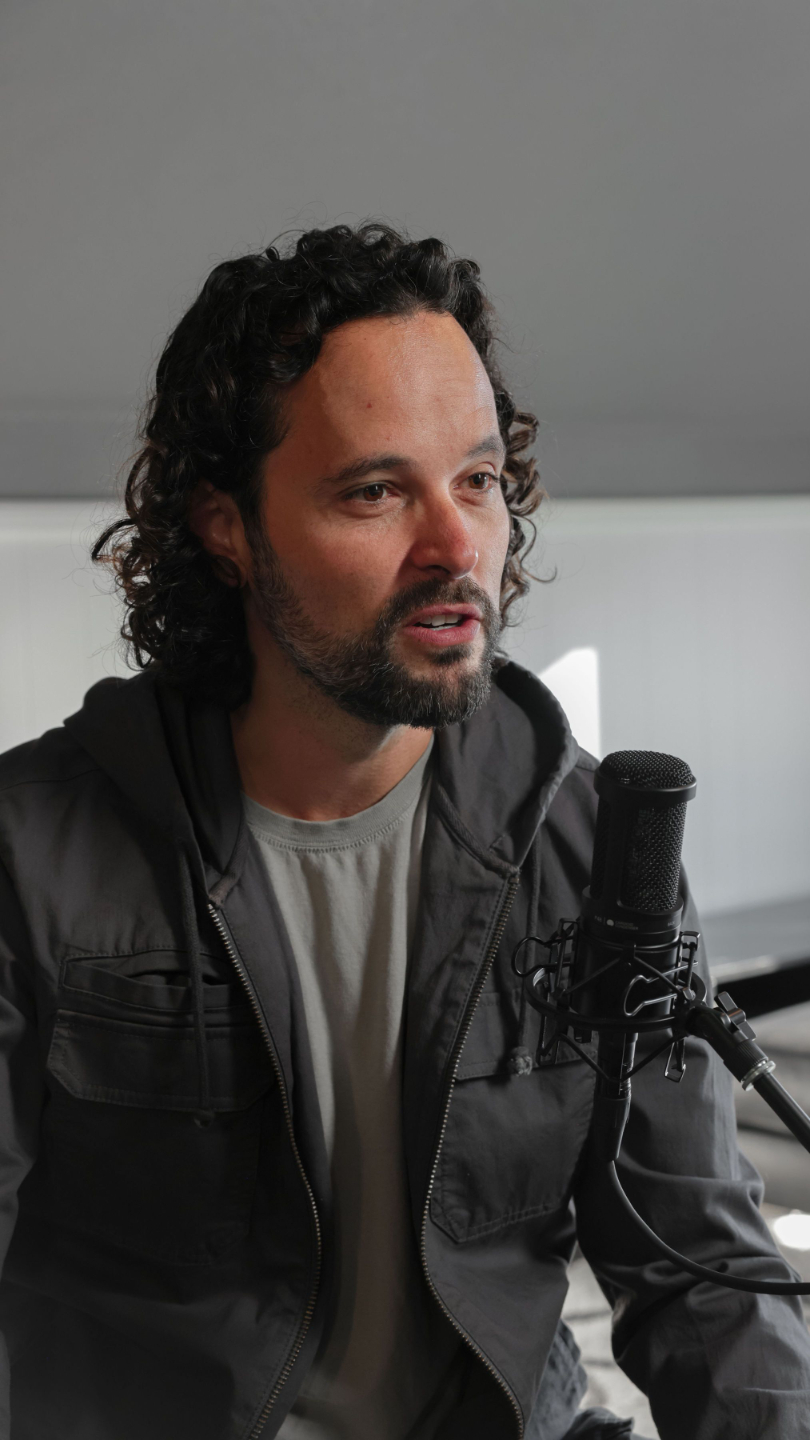The Need to "Be Right" Is Destroying Your Marriage. Here’s What to Do Instead
The Moment You've Been Saying It and She Finally Does
Let me take you into a moment that happens in almost every marriage. You're standing in the kitchen, or maybe you're folding laundry. She brings something up, an idea, a change, a solution, and it's something you've already said.
Maybe not once, maybe not twice. Maybe you've said it so many times. You stopped trying and now suddenly she says it like it's brand new and inside of you something tenses, you wanna smile and nod. But what comes up is frustration. You think, are you kidding me? I said this for months. You wanna say, I told you so.
You want her to know she's late to the party? Or maybe it flips the other way. Maybe you are the one finally getting it. You are doing the work, you're showing up differently. And now she's the one saying. I've been asking for this for years. Why now? Whichever side of that moment you're on, I want you to listen closely today because how you respond in those moments matter a lot.
They can bring you closer or they can make things worse even when you're doing everything right.
The Impact of 'I Told You So'
In this episode, we're going to talk about why the words I told you so, or even the energy behind them can sabotage connection. We'll talk about the need to be right, how it shows up in small ways and what.
To say instead, I'll also walk you through what to do if you are on the receiving end of that moment. If your wife is frustrated that you're only now showing up differently, and how to stay grounded when you're not being met the way you hoped. Stick around, you don't wanna miss this one.
Welcome to Better Husband, the podcast that helps you answer the question, how can I be a better husband? I'm Angelo Santiago, a men's marriage and relationship coach, and every week I bring you practical insights to help you strengthen your marriage and become the best husband you can be.
The Time She Was Right and I Didn't Get Defensive
So let me tell you what happened the other day. It's summer here in Texas, and no matter how healthy we try to eat as a family, at some point we're going to want ice cream. We do our best. We read labels, try alternatives, aim for better. Not perfect, but sometimes you just want something cold, creamy, and bad for you in the best kind of way.
So I'm in the kitchen scrolling through recipes, and I come across this thing called the Ninja Creamy. If you don't know, it's a kitchen appliance that turns fruit and protein shakes into ice cream, bananas, frozen berries, almond milk. You get the idea. I start looking at reviews and videos and getting excited, and I turn to my wife and say, Hey, what do you think about us getting one of these ninja creamy things, the look on our face?
Says everything. She smiles wide, shakes her head a little and says, I literally told you about that six months ago. I said, we should have gotten one. And she's right. She did bring it up months ago, and I probably brushed it off. I probably thought it was totally unnecessary thing to buy, and honestly, I wouldn't even be thinking about it now if she hadn't planted the seed back then.
Now, here's where it could have gone sideways. A past version of me, especially the defensive one, would've gotten irritated, maybe shut down, maybe said something like, well, why didn't you remind me? Or turned it into a joke, to deflect the embarrassment. But in that moment, I caught it. I noticed the part of me that wanted to react, and instead I smiled and said, you're right.
You did say that.
But I also caught the part of her that leaned into the, I told you so energy and thought that there's probably a better way that we could both do this.
And so I invited us to try it all over again. And because we've been practicing this, staying light, staying connected, being willing to rewind and try again, I looked at her and said, want to do a take two? So she stepped back like she was reentering the room and I asked the question again, like it was brand new.
Hey, what do you think about us getting one of these ninja creamy things?
And this time she lit up. She said, oh my God, yes. That's such a great idea. And we both cracked up. And that moment was easy. It was playful, but it didn't happen by accident. It happened because we've done the work. We've learned how to read each other, how to stay soft when it gets easy to get sharp, how to choose connection instead of correction.
10 years ago, that same moment might have ended in tension or silence, or one of us going to bed annoyed, and most importantly, the ninja Creamy never getting purchased out of resent. And maybe as you're listening, you're thinking, yeah, well, there's no way I would've responded like that, or I probably would've shut down, or I definitely would've said something I regretted and I get it.
I've been there moments like this where you stay grounded, stay open, and keep the connection intact. They don't just happen. They come from practice. So if you're not there yet, that's okay. You can build it.
Understanding the Need to Be Right
That's what we're unpacking in this episode, because while this story might seem silly, some ice cream machine and a quick back and forth, it shows something deeper.
How easy it is to ruin a good moment by needing to be right. Now, in this case, it was my wife who brought that, I told you so energy. And because of where we're at, we caught it, laughed about it and made it playful. But I wanna be clear, I've been on the other side more times than I can count. I've made a suggestion over and over something I thought would help, and then she'd come around to it later, maybe after seeing it online or hearing it from somebody else.
And in that moment, something flared up in me and that part wants to say, I've been saying that for months where I already told you that, or now you get it. And that's what I wanna focus on today, because when we're the ones bringing that, I told you so energy, even subtly, even with a joke, we often end up doing the exact thing we didn't want to do.
We shut down connection, we push her away. We turn a chance to build trust into another point of disconnection. So if you've felt dismissed in the past, if you've been trying to get through to your wife and she finally comes around, but instead of joining her, you feel the urge to correct her. This part is for you.
Let's look at what really happens in those moments. Because when she finally says something you've been saying for months, there's the part of you that flares up the part that says, I already told you that. I've been saying this forever.
Now you get it. It might not come out as words. Sometimes it's a shift in tone, a look, a pause that changes the energy. But whether you say it out loud or not, the hidden message is the same. You are late. I've been ahead of you this whole time. And that right there is where connection breaks. She's finally joined you.
She's aligned with the thing you've been asking for. And your first move is to tell her that she should have arrived sooner.
And when you respond with, I told you so even indirectly, you're telling her the timing matters more than the connection. And it comes from something in you that still wants credit, still wants to feel seen, still wants to prove you were right all along. But being right without connection is empty.
if what you want is intimacy, trust, and partnership, then the moment she joins you is not the time to lecture her on how long it took. It's the time to meet her as she is. Right now. 'cause that's where connection lives. If you've been listening to this podcast for a while, you've probably heard me talk about something called the losing strategies.
These aren't strategies we consciously choose. They're patterns. We picked up early in life ways we learned to protect ourselves when connection felt unsafe or uncertain. And one of those strategies is being right. That's what shows up in the moment of I told you so.
It's the voice in you that wants to prove a point. The part that needs validation, the part that believes, if she could just admit you are right, then everything would feel better. But here's the problem, being right doesn't lead to closeness. It leads to disconnection because the energy of being right is about power, not partnership.
It puts you above her, not beside her. It says, I knew better you didn't listen. You should have trusted me. Even if the facts are on your side, the energy is what breaks the moment. Because what your partner feels isn't, he's wise and thoughtful.
She feels he's condescending. He's keeping score. That's why it's called a losing strategy. Even if you win the point, you lose the connection. And let's be honest, sometimes being right does feel good for a second. It feels powerful, it feels satisfying, but the cost is trust. The cost is warmth. The cost is her wanting to open Up to you next time.
That's not what you want. What you want is togetherness. What you want is for her to join you, not resent you. What you want is to keep the door open so she keeps coming towards you, and that only happens when you resist the pull to correct her when you let go of being right and choose to be relational instead.
Now, if this is the first time you're hearing about the losing strategies, here are the other ones we often fall into in relationships controlling, retaliation, withdrawal. Unbridled self-expression and this one being right. Each one has a way of protecting us while sabotaging the connection. And we'll talk about the others in future episodes, but today, just focus on this.
In that moment when she finally joins you, don't pull rank. Don't prove a point. Just meet her there. Because being right isn't actually what you're craving. Being close is.
How to Respond When She Finally Agrees With You
So if you're listening and thinking, okay, that sounds good. I want to do that, but I'm not sure how to do it or what to say, let's talk about what you actually should do when this happens.
When she brings something up that sounds familiar, something you've said, something you've wanted, and it finally lands, you meet her there, you take a breath, you let go of the scorecard, and you say something simple like, that's a great idea, or, I love that you're thinking about this, or Let's do it. No sarcasm, no edge.
Just clean support. You don't have to pretend you never said it first. You just don't need to prove it in that moment. That's the move from tracking the timeline to receiving what's there. That's being relational, that's being a better husband. It says, I'm not here to correct you.
I'm here to move forward with you. And when you start responding in that way, you become a man. She wants to bring ideas to you. Create a space where she wants to align with you, because when alignment is safe, it happens more often. But when it comes with critique, she'll start holding back. This is how you rewrite the pattern.
This is how you create momentum together. By meeting the moment, not managing the memory of how long it took to arrive. Let me give you something you can actually do in that moment, because even with the best intentions, you're still going to feel it sometimes. That little flare of weight. I said that already, or that instinct to prove you were ahead of the curve. That part of you that wants some credit. So here's what to do instead. First notice it. Catch the reaction before it becomes a comment.
Even if it's just an eye roll, a sigh, a shift in tone. Just notice it because that's the doorway to choice. Then pause. This doesn't have to be a big dramatic moment, it's just a breath, a small space between reaction and response. And in that pause, ask yourself, what does this moment need from me? Not what do I deserve right now?
Not how do I get acknowledged for being right, but what would actually build connection? Right now, nine times out of 10, it's not correction, it's receptivity, it's warmth, it's affirmation. Say something like, yeah, I love that, or That's a really good idea, or, let's try that and mean it. Let it land. Let her feel that you're with her.
The point here isn't to stuff your feelings, it's to practice responding in a way that strengthens connection, not corrects it. You're not erasing the past, you're just choosing whether using it will help or hurt your marriage.
What to Do When You’re the One Being Told “I Told You So”
Now, let me talk to the men who are on the other side of this, because maybe this hasn't been your experience.
Maybe you're not the one saying, I told you so. Maybe you're the one hearing it. You've been doing the work, you've been showing up differently, you're regulating more, you're listening better. You're making changes she's been asking for for years, and now that you're finally giving it, she's upset. She's not celebrating you, she's questioning it.
She's saying things like, I've been asking this forever. Why now? Where was this version of you When I needed him. And it stings because you want to be seen, you want to be acknowledged. You want her to meet you in this new place you're standing in, but instead of getting acknowledgement, you're getting resentment.
And it's confusing. It's disheartening. You might feel saying, what's the point? But I want you to understand something deeper When this happens, and it does happen for a lot of the men I work with, what you're hearing isn't just frustration. You're hearing grief. She's been carrying the weight of unmet needs. She's been trying to get through to you for years. She's been hoping, asking, repeating until she's stopped believing it would ever change. So now when it finally does, part of her doesn't trust it. Part of her is still hurting. Part of her doesn't know if it's safe to receive what you're finally giving.
That's what this is. This is what we call transmission and reception. You're transmitting something new. Presence, care, consistency. But she might not be able to receive it yet because the old pattern of being dismissed, of feeling alone still lives in her body. You can't force her to receive. You can't demand a better reaction.
You can't shortcut the process of rebuilding trust, but you can stay with it. You can say, I know I didn't hear you back then. I see that now. Or, I'm sorry it took me so long. I'm here now. Or, how can I show you that this is real? And you can keep showing up without needing her to be excited about it right away.
Because this isn't a moment for credit. It's a moment for patience, for empathy, for staying steady, even when her walls are still up. And if she says, why, now you can say, because I'm finally seeing what I couldn't before and I don't want to go back. You're not just making a change. You're becoming a man who keeps showing up even when it's hard, even when it's not received perfectly, even when it hurts a little.
That's how you rebuild trust, not by doing the right thing once, but by doing it again and again.
This Week: What to Do, Say, and Reflect On
Here's what I want you to do this week to put all of this into practice.
One, catch the moment when your partner brings something up, an idea, a plan, a shift, and it sounds exactly like something you said months ago. Pause. Notice what rises in you. Notice the part that wants to correcter. Then ask yourself, is this a moment to be right or to build connection? Two, respond with warmth, not correction.
Say, that's a great idea, or, I love that you're thinking about this. Let's do it. Keep it light, keep it clean. Let her feel joined, not judged. Three, if you're on the receiving end of I told you so. Breathe, stay grounded. Don't collapse. Don't defend. Don't get bitter. Instead, respond with something like, I know this has taken me a while.
I really want to get it right now. Or How can I show you that I'm here for real? You're not trying to win the moment you're trying to keep the door open. And four, choose one moment this week to lead with generosity. Whether you're being asked to see something new or finally being seen yourself. Choose the posture that protects the connection, even if it means letting go of the need to be acknowledged.
Here are a few questions to sit with on your own in your journal, or even in conversation with someone you trust. One. Where in your marriage have you chosen being right over being connected? Was it worth it? What did it cost? Two, what happens inside you when your partner says something you've already said before?
Do you feel dismissed? Do you want to prove something? What would it take to let that go? three. If your wife has told you, I've been asking for this for years, how do you normally respond? Can you stay with her in the pain without making it about you?
And four, what kind of man do you want to be in those moments? The one who needs to be acknowledged or the one who makes it safe to move forward. These aren't easy questions, but answering them honestly is part of the work, the kind of work that actually transforms a marriage.
Don’t Choose Being Right, Choose Being Together
Here's what I want you to remember.
When your wife finally gets it, when she brings you something you've been saying for months, that's not the moment to score a point. That's the moment to build something together. And if you're the one finally showing up differently and she meets you with frustration instead of gratitude, that's not a sign to quit.
It's a sign to keep going. 'cause rebuilding trust isn't instant. It's slow, it's steady. It's built through how you respond, when it would be easier to retreat. So the next time you feel that urge to say, I told you so, pause, ask yourself is what I'm about to say, going to help or hurt the relationship. What would the better husband part of me say instead?
That's what being relational looks like and that's what your marriage is asking for . If you're ready to keep building that, if you want a space to practice it, to get support to actually grow into the man your marriage needs, that's what we do inside of Better Husband Academy.
Go to better husband academy.com to learn more. I'm Angelo Santiago. Thanks for listening, and I'll see you in the next episode.







